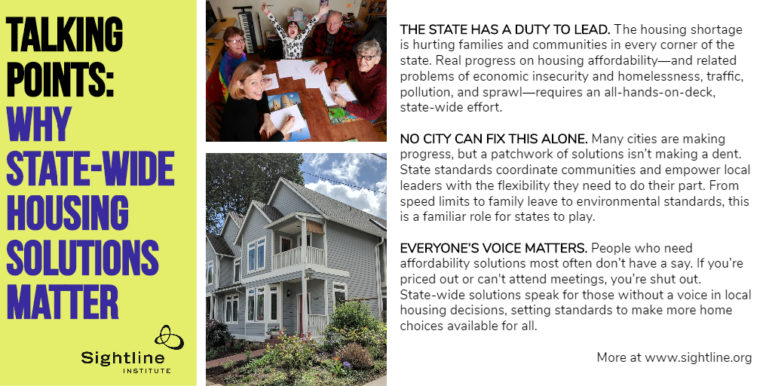The severe housing shortage in Washington is hurting families and communities in every corner of the state. And the fact is, even with many cities stepping up and doing everything they can, local jurisdictions still struggle to enact solutions that will make a dent in the problem. The answer is state-level leadership. Washington households need state-wide housing solutions.
States set standards all the time to protect their residents’ health, safety, and well being. Think: auto emissions and speed limits, or state-wide growth management standards for cities and counties to protect farms and forests. Real progress on housing affordability requires the same kind of coordinated state-wide effort.
When proposals for state-level housing affordability solutions are on the table, opponents often play the “local control” card.
But waiting on each jurisdiction to act to supply the homes residents of the state desperately need is spinning Washington’s housing crisis further out of control. Washington families can’t endure costly delays and an insufficient patchwork of policies. And people who are priced out often have little say in decisions about home choices where they need them most.
The proposals before Washington lawmakers still ensure that cities keep lots of control. Both the land use reform bills now under consideration by legislators in Olympia—a proposal to allow “missing middle” housing like duplexes, triplexes, and rowhouses in more neighborhoods (HB 2780 and SB 6536), and an accessory dwelling unit (ADU) proposal to make it easier to add granny flats and backyard cottages (HB 2570 and SB 6617)—would set a bar and hold local governments accountable for doing their part, but would build in ample local flexibility.
Here’s why state-wide housing solutions not only make sense—but are urgently needed to protect the people and places Washingtonians love.

WASHINGTON STATE HAS A DUTY TO LEAD. Housing affordability is a matter of basic security, justice, and economic opportunity for all.
- State leaders can’t sit on their hands while Washington’s housing crisis spins further out of control, hurting families and communities in every corner of the state.
- The connected problems of homelessness and housing insecurity, wealth inequality, sprawl and loss of habitat, traffic congestion and pollution, require us to act boldly and swiftly.
- State standards give cities the tools they need to reverse the legacy of redlining, systematic downzoning, and exclusionary zoning that continue to wall off access and opportunity and segregate our communities and school districts.
- A severe shortage of homes and resulting prices are pushing people farther from their jobs. State standards keep Washington families from costly, crushing commutes.
- Setting standards to make more home choices available and affordable in our communities safeguards our health and environment from pollution, traffic, sprawl, and climate change.
NO CITY CAN FIX THIS ALONE. State standards coordinate cities and empower local leaders with the flexibility they need to do their part.
- The answer is to set state-wide standards with plenty of local flexibility.
- This is a familiar role for states to play–and a critical one. States set standards all the time to protect their residents’ health, safety, and well being. Think: auto emissions and speed limits, family leave and workplace safety, or state-wide growth management standards to protect farms and forests. We need similar reasonable, effective, state-level standards to make real progress on housing availability and affordability.
- The housing crisis crosses municipal boundaries, it spans communities on the east and west sides of the mountains, and it’s hurting people in big and small cities. The problem is too big and widespread for cities to tackle alone.
- Many cities are making progress, but a handful of cities acting alone can’t make a dent in the state-wide problem.
- Washington can set state standards to address affordability while giving each community plenty of flexibility to make it work in their local context.
EVERYONE’S VOICE MATTERS. State-wide solutions speak for those without a voice in local housing decisions.
- The Washingtonians who need affordability solutions the most often don’t have a say.
- Workers who commute from outside jurisdictions have no say in local decisions about adding more housing near their jobs.
- The small minority of people who engage in land use decisions locally are more likely than the average resident to be wealthier, older, whiter, and more likely to own than rent. Vocal opposition by a few often drowns out the voices of less affluent neighbors, homeless or insecure households, lower-income households, and renters.
- Washington state can set a foundation for affordability that cities can build on to make sure more homes, all shapes and sizes, are available so everyone can afford to live in our communities.
The connected problems of homelessness and housing insecurity, wealth inequality, sprawl and loss of habitat, traffic congestion and pollution, require us to act boldly and swiftly. Affordability solutions are at the heart of these shared challenges. State leaders can play a critical role setting reasonable, effective standards with flexibility to empower cities to do their part in ways that fit their communities.

